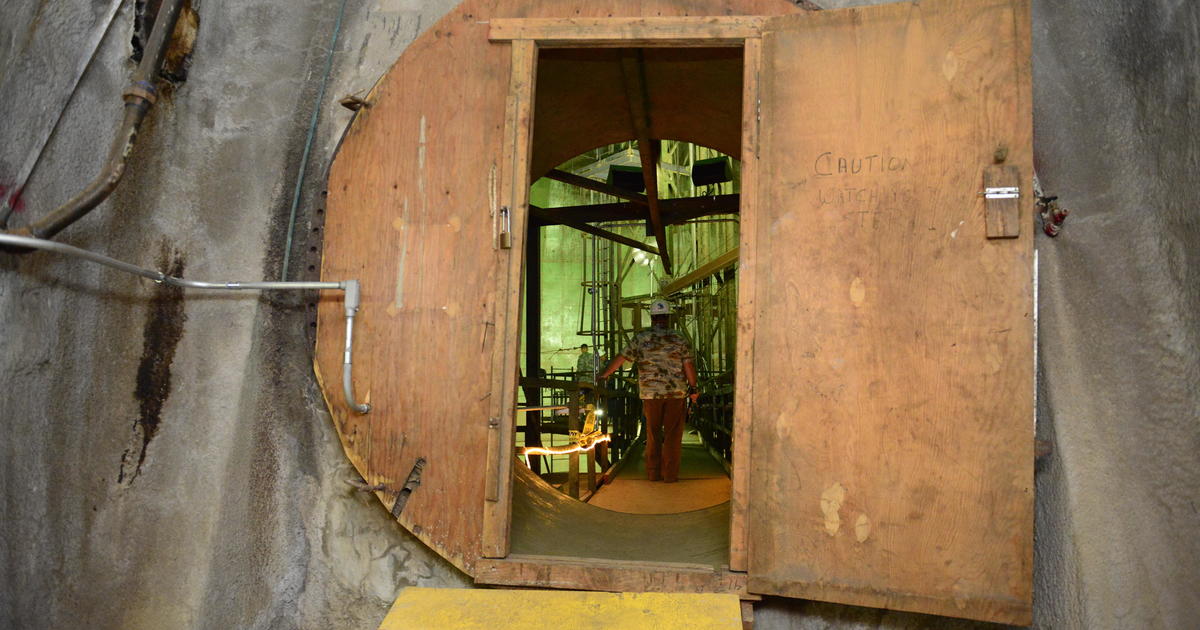New Jersey
Aqua New Jersey develops new water treatment system to remove harmful PFAS in Lawrenceville

LAWRENCEVILLE, N.J. (CBS) — Water utility company, Aqua New Jersey, cut the ribbon on Monday for a new water treatment system in Lawrenceville designed to capture and remove PFAS.
PFAS, also known as “forever chemicals,” are everywhere, including in food packaging and waterproof cosmetics, and PFAS can linger permanently in air, water and soil.
According to the EPA, it’s been linked to ovarian cancer, liver damage and developmental issues in children.
“They are in a lot of things that we use in daily use,” Kristin Tedesco, of the New Jersey Department of Environmental Protection, said. “They do not break down so it’s very difficult to get rid of them.”
It’s particularly difficult to get rid of PFAS in tap water, which is why, according to Adam Burger of Aqua New Jersey, the utility company decided to construct a new treatment system in Lawrenceville.
“When we saw the rising levels in Lawrenceville, we decided to begin the design process and get ahead of it before we were in any danger of violations,” Burger said.
The new $3 million treatment system is coming just nearly a week after the EPA announced the first national standards to limit PFAS.
Aqua New Jersey’s system uses resin beads, which act as a magnet, to remove PFAS from Lawrenceville’s drinking water.
“Specifically for Aqua New Jersey, we’re looking at probably $70-80 million to remediate all the sites contaminated with PFAS,” Burger said.
He added it’s difficult to determine who exactly is polluting the drinking water with PFAS, but the people who are affected, like Ashley McClister, who lives near the new treatment system, are optimistic about the improvements.
“Our hopes, as families that live in the community, are that it’s actually going to improve our quality of water,” McClister said. “I think it’s been a couple years where we haven’t had the best quality for our children here.”
This system is expected to be fully operational on May 1.

New Jersey
New Jersey teen arrested for swatting Bayonne school

A 15-year-old New Jersey girl was arrested for swatting William Shemin Midtown Community School in Bayonne.
It’s unclear if the teenager accused of falsely alerting police to an emergency situation attends the 1,200 student elementary school she shut down for about an hour Monday morning, according to NJ.Com.
Law enforcement closed streets near the campus while making sure the apparent prank posed no risk.
“At no time was the safety of any student, faculty member, or general public at risk,” the Bayonne Police Department said in a statement posted Wednesday.
School officials announced a shelter in place order when the incident unfolded, then lifted the order soon after realizing the report was a hoax.
“Please be advised that the shelter in place has been lifted and all is well at the Den,” the “Home of the Bears” posted Monday.
The suspect in Monday’s swatting reportedly faces a fourth-degree felony charge that would land an adult in prison for up to 18 months. A $10,000 fine could also be imposed.
New Jersey
New Jersey shakes for the over 150th time since April earthquake

🔺 The state has felt over 150 aftershocks since the April 4 earthquake
🔺 Wednesday’s was one of the strongest aftershocks
🔺 Over 376 people reported feeling it to the USGS
The state experienced yet another aftershock Wednesday morning nearly a month after the strongest earthquake in New Jersey’s history shook the state.
The magnitude 2.6 earthquake happened at 7:01 a.m. and was centered 2.6 miles WNW of Gladstone near the Morris County/Somerset County border, according to the US Geological Survey. Reports about the earthquake came mostly from Hunterdon, Somerset and Morris counties with reports as far south as Mercer County.
It was the 150th recorded aftershock since the initial magnitude 4.8 earthquake centered near Whitehouse Station on April 4. Another strong magnitude 2.9 tremor was recorded on Saturday.
Map shows all aftershocks since April 8
Did you feel it?
While over 376 people reported feeling Wednesday’s aftershock to the USGS New Jersey 101.5 Chief Meteorologist Dan Zarrow said if you didn’t feel it that’s normal.
“Anything below a magnitude M3.0 on the Richter scale is barely even worth mentioning. Such quakes are rarely felt by humans. And damage to infrastructure is unlikely,” Zarrow said.
Zarrow said Wednesday’s aftershock was 158 times smaller than the initial earthquake in early April. And it released almost 2000x less seismic energy.
Aftershock kits
“Aftershock kits” have been deployed in and around the earthquake’s epicenter (Hunterdon County) by the U.S. Geological Survey and experts at labs from throughout the country. The temporary seismometers, which are scheduled to be here for months, are taking in any rumblings that may occur in the aftermath of the quake.
Experts will learn more about the frequency of aftershocks, and how energetic they can be. In general, studying aftershocks can provide researchers with vital information about the nature of earthquakes so society can be best prepared for future events.
Previous reporting by Dino Flammia was used in this report
Report a correction 👈 | 👉 Contact our newsroom
High expenses necessary to raise just one kid in NJ
Gallery Credit: Mike Brant
How much does parking cost at NJ fun spots?
It’s great to spend time at New Jersey amusements and fun spots. Some places charge to both park and get into an attraction while others offer free parking. (information is as of April 22, 2024)
Gallery Credit: Dan Alexander
NJ DOT’s 2024 collection of humorous safety messages
The NJ DOT continued to use a series of humorous seasonal safety messages on its’ over 200 electronic signs around New Jersey.
Gallery Credit: Dan Alexander
New Jersey
43 years ago today: U.S. Senator from N.J. convicted of bribery – New Jersey Globe

Before gold bars, it was titanium.
Forty-three years ago today, Harrison A. Williams, Jr., a four-term U.S. Senator from New Jersey, was convicted on federal bribery and conspiracy charges related to the ABSCAM scandal.
The anniversary of a jury verdict that found Williams guilty of nine counts of corruption comes less than two weeks before the criminal trial of his successor, Bob Menendez, begins on May 13.
The outcome of this trial could lead to the three-term Democrat seeking re-election as an independent – or an interim appointment to Menendez’s Senate seat by Gov. Phil Murphy.
Williams maintained his innocence and refused to leave the Senate. He stayed there for more than ten months, resigning just as his colleagues were on the verge of expelling him.
Undercover FBI agents posed as Arab sheiks in a sting operation that led to the convictions of Williams, six congressmen, including 13-term Rep. Frank Thompson, Jr. (D-Trenton), and others, including State Sen. Angelo Errichetti, the mayor of Camden.
After nearly 28 hours of deliberation, a jury believed the Justice Department’s allegation that Williams and Alexander Feinberg, a former Assistant U.S. Attorney and 1958 Democratic congressional candidate, received an 18% share in a Virginia titanium mine in exchange for the senator’s help in obtaining military contracts. The mine was to be resold with a profit of $12.6 million for Williams.
Williams was the chairman of the Senate Labor and Human Resources Committee at the time of his indictment.
The senator’s friends claimed he got into trouble because his second wife, Jeanette, his former Senate staffer, had lofty ambitions and lavish tastes he could not afford.
Jeanette Williams claimed that Jimmy Carter’s White House was retaliating against her husband for backing Ted Kennedy in the 1980 Democratic presidential primary, and alleged that the governor of New Jersey, a Carter supporter, hoped to replace Williams.
“Why can’t I say it,” she said after the verdict. “Brendan Byrne wants his seat. According to the Star-Ledger, from behind a closed door, Jeanette Williams yelled, “It was an outrage from beginning to end.”
Hours after Wiliams was convicted, the Senate Ethics announced their own investigation. They had opened a probe in 1980 after new reports of Williams’ involvement in the sting operation but suspended it after the Justice Department unsealed its indictment.
Williams would not resign his seat.
“While I may have crossed over the line which divides appropriate service to constituents from excessive boasting and posturing,” Williams told the Senate Ethics Committee. “I never engaged in any illegal conduct; I never corrupted my office, and I never intended to do anything that would bring dishonor to the Senate.”
Calling his behavior “ethically repugnant, the committee voted unanimously in August 1981 to recommend
Williams went to court to challenge the Ethics Committee’s refusal to allow him to be represented by counsel during their process, but a federal judge refused his bid for a temporary restraining order to prevent the Senate from ousting him.
Hawaii Democrat Daniel Inouye had agreed to represent Williams on the Senate floor and was granted several delays as he prepared to defend his colleague.
Republicans had ended a 24-year Democratic majority in 1980, and Williams’ seat was up in 1982. In the background was the closest gubernatorial race in New Jersey history; after a recount that went to the end of November, Republican Tom Kean edged out Democrat Jim Florio by just 1,797 votes, 49.46% to 49.38%.
To avoid Kean’s appointment of a Republican U.S. Senator, Democrats in New Jersey and Washington began to intensify their pressure on Williams to resign so that the outgoing governor, Democrat Brendan Byrne, could make the appointment. But Williams, whose sentencing had been pushed to February 1982, refused to go.
Democrats, led by Minority Leader Robert Byrd, sharpened their push in the days before Kean’s January 19, 1982 inauguration, which continued into inauguration day.
Byrne went to Kean’s inaugural with a letter in his suit pocket addressed to Secretary of State Donald Lan appointing former Senate President Joseph Merlino to the United States Senate. Lan was ordered to remain at Byrne’s side, without fail, until the moment Kean took office, just in case Williams changed his mind at the last minute and resigned.
(While Menendez was on trial in 2017, then-Gov. Chris Christie was preparing to appoint Bob Hugin, the head of a New Jersey pharmaceutical company, Celgene, to replace him. Hugin had committed to self-funding his 2018 campaign; he wound up doing that anyway, but lost to Menendez.)
Bradley stood by Williams until almost the end
The state’s other senator, Bill Bradley, stood by him and said that government allegations aren’t always true. Bradley still refused to call for Williams’s resignation following his 1981 conviction.
In March 1982, ten months after Williams’s conviction, the United States Senate moved to debate whether Williams would become just the third U.S. Senator in history – and the first since the Civil War – to be expelled. Expulsion required a two-thirds vote.
But on March 10, at the end of the fifth day of the Senate expulsion trial, Bradley announced that he would vote to expel Williams. The loss of Bradley tipped the scales; with a vote near and without the support to avoid being expelled, Williams, for the first time, hinted that resignation was an option. He resigned the following day.
Williams was sentenced to three years in federal prison and served 21 months.
In a 1986 interview, Williams said he was convicted of a “dishonest crime.” He defined that as “when someone else creates the situation for which you are convicted.
Suffering from heart disease in late 2000, he asked Bill Clinton to pardon him. Clinton declined, and Williams died in 2001 at age 81.
Williams had lost bids for the State Assembly and the Plainfield City Council before winning a 1953 special election for Congress. He was re-elected in 1954 but unseated two years later by Republican Florence Dwyer (R-Elizabeth). He defeated Rep. Robert W. Kean (R-Livingston) for an open U.S. Senate seat in 1958. In 1980, just a few weeks before his involvement in Abscam became known, he publicly toted with running for governor in 1981.
Thompson, the powerful chairman of the House Administration Committee, lost his seat in 1980 to Republican Christopher Smith, then a 27-year-old pro-life lobbyist and now the longest-serving congressman in New Jersey history.
This will be Menendez’s second bribery trial. In 2017, a jury failed to deliver a verdict on different alleged crimes. The charges against him were dropped, and Menendez won re-election to the Senate by a wide margin.
During Williams’ legal troubles, Menendez was in between stints on the Union City Board of Education and his election as mayor in 1986.
It’s unclear how the Senate will immediately deal with Menendez if he’s convicted, although the Ethics Committee would be likely to take up the case quickly.
Democrats are battling to hold control of the U.S. Senate, and at least four of their incumbents are in tough races. Republicans in those states could make an issue of Menendez remaining in the Senate. It would take 67 votes to remove him from office. Murphy would appoint a caretaker to hold the seat until January 3, 2025.
Friends of Menendez insist he’ll never resign.
-

 Education1 week ago
Education1 week agoVideo: Dozens of Yale Students Arrested as Campus Protests Spread
-

 World6 days ago
World6 days agoHaiti Prime Minister Ariel Henry resigns, transitional council takes power
-

 News7 days ago
News7 days agoLarry Webb’s deathbed confession solves 2000 cold case murder of Susan and Natasha Carter, 10, whose remains were found hours after he died
-

 Politics1 week ago
Politics1 week agoFetterman hammers 'a–hole' anti-Israel protesters, slams own party for response to Iranian attack: 'Crazy'
-

 World1 week ago
World1 week agoPeriod poverty still a problem within the EU despite tax breaks
-

 World7 days ago
World7 days agoUS secretly sent long-range ATACMS weapons to Ukraine
-

 News6 days ago
News6 days agoFirst cargo ship passes through new channel since Baltimore bridge collapse
-

 World1 week ago
World1 week agoTurkey’s Erdogan meets Iraq PM for talks on water, security and trade





/cdn.vox-cdn.com/uploads/chorus_asset/file/24648944/asus_rog_ally_vjeran_pavic_the_verge_003.jpg)












